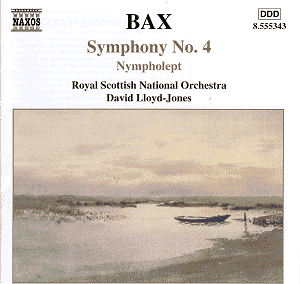The seven symphonies of Sir Arnold Bax can be counted
among the most important orchestral compositions by a British composer
of the 20th century. Each has its own particular personality, but each
is also true to the principles and artistic vision of the composer.
Other issues in the continuing series of recordings
from David Lloyd-Jones on Naxos have been received with acclaim, to
the extent of being award winners, so this new issue must be taken very
seriously indeed. And the experience of listening justifies all this
enthusiasm.
Composed around 1930 for a large orchestra including
six horns and organ, the Fourth can lay serious claim to being Bax's
orchestral masterpiece. It has never been performed as frequently as
the Third, perhaps because of the need for the organ, but the previous
recording by Bryden Thomson and the Ulster Orchestra, well recorded
by Chandos nearly twenty years ago (CHAN8312) showed the standard of
imagination and symphonic strength Bax had achieved.
Lloyd-Jones conducts a performance which seems 'leaner
and fitter' than Thomson's, and so complements it admirably. One feels
the symphonic momentum is placed as a higher priority, less so the indulgence
in splendour of sound. The orchestral playing from Scotland is of the
highest order, both in ensemble and individual contributions.
As so often in a large-scale symphony, it is the slow
movement which is the heart of the work. Bax preferred to compose his
symphonies in three large movements, and this Lento moderato is surely
one of the best he ever created. The recording comes up well, as when
the bass drum adds its subtle yet expressively powerful contribution.
The dynamic may be restrained but the presence is everything.
On the other hand, the Allegro finale has a spontaneity
and vitality which move the music into new regions, and the symphonic
argument justifies the sweeping power of the final bars. All told, a
fine symphony well performed.
Composed the same year as the Symphony No. 4, the Overture
to a Picaresque Comedy is a slighter piece, of course, but it is
most entertaining and serves its purpose as a lively opening item. For
contrast the programme is completed by a rarity which shows one of the
extremes of Bax's range. Nympholept was originally an early piano
piece, composed before the First World War, which was later orchestrated
in full romantic indulgence. Bax never heard it performed in this version,
and he would surely have enjoyed the splendid sound generated by the
Scottish orchestra and Naxos.
Terry Barfoot


